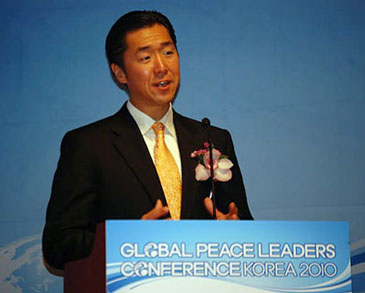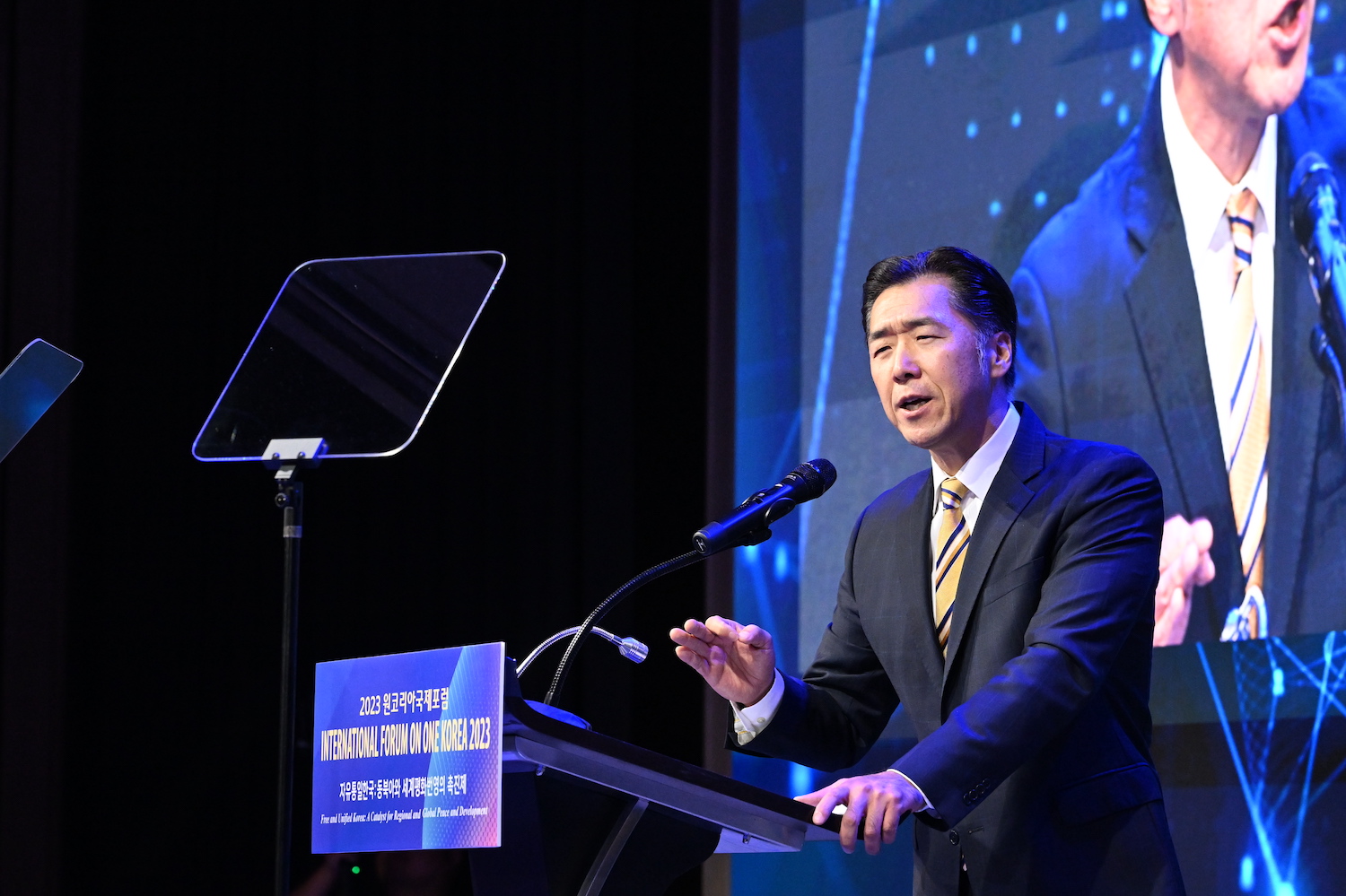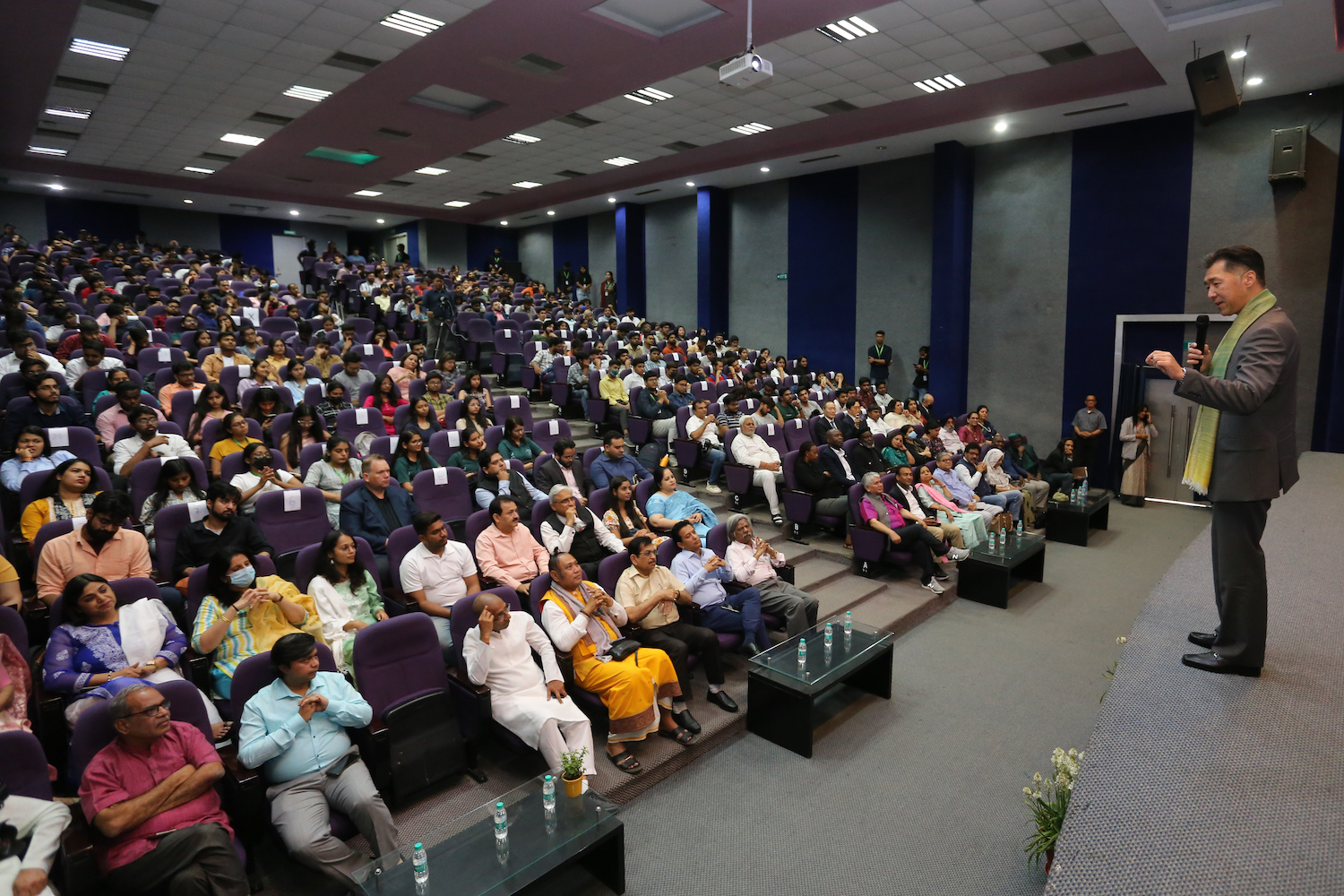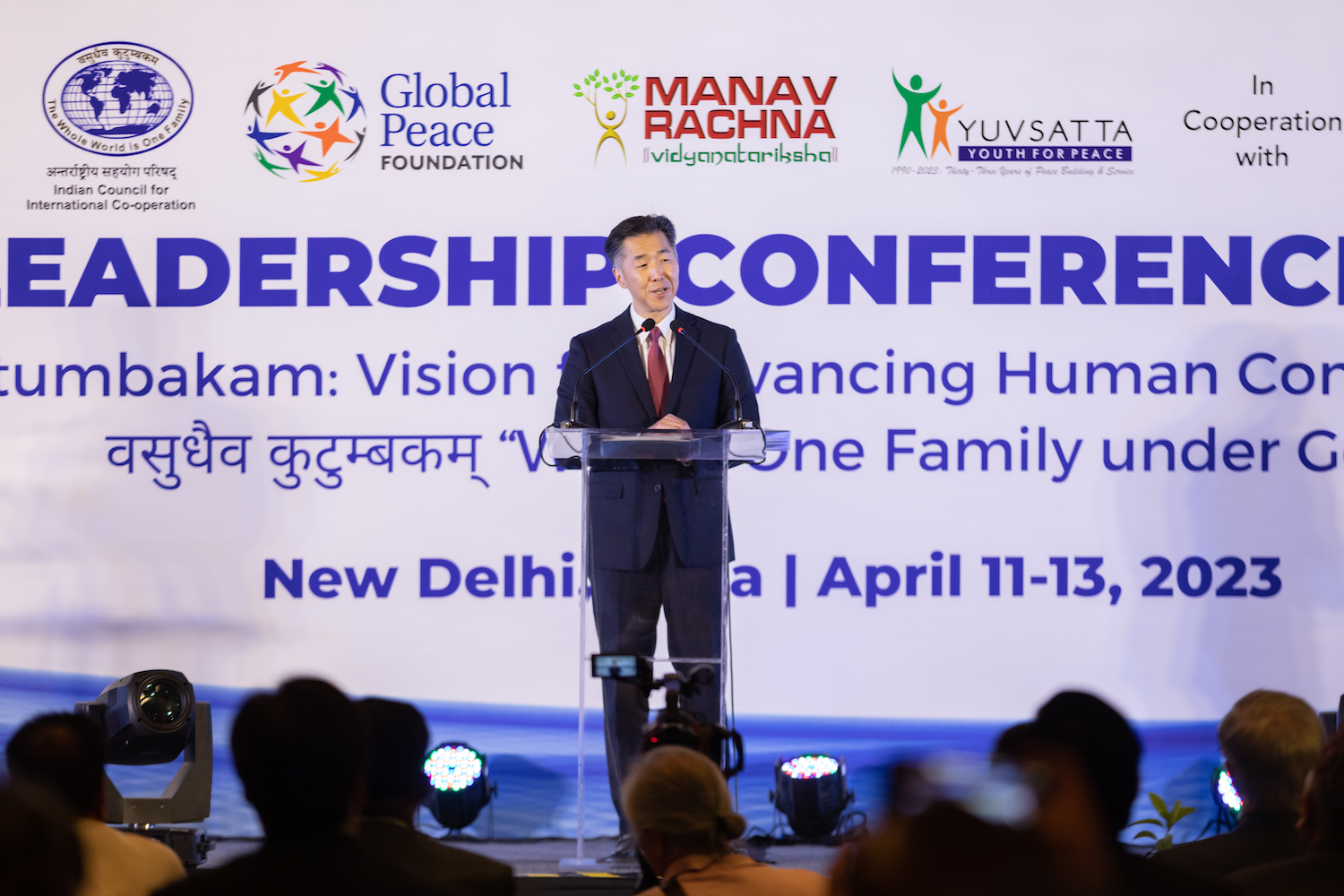December 12, 2010
Seoul, Korea
Theme: “Vision, Principles and Values for the Unified Korea”
 Your excellencies, honored guests, distinguished participants from around the world,
Your excellencies, honored guests, distinguished participants from around the world,
It is a distinct pleasure to meet you here at the Global Peace Leadership Conference in my birth nation of Korea. Thank you for your participation and your continuing support in this noble cause for peace.
Let me first express my appreciation for those who have worked tirelessly to make this significant Global Peace Leadership Conference a reality. It is only through “true owners,” who are willing to make the necessary sacrifices out of their busy schedules, that the all too important work for peace is sustained. I especially want to recognize Dr. Lee Ki-taek, the executive vice chairman of National Unification Advisory Council and chairman of GPLC Korea 2010, who has left a legacy of integrity in Korean politics. I also want to thank Dr. Song Young-sun, a member of the Korea National Assembly and member of the Global Peace Festival Foundation’s Global Leadership Council, the GPLC Organizing Committee, cooperating government agency partners, and countless volunteers for their dedicated efforts in organizing these important deliberations.
I also want to salute and thank the esteemed Dr. Manu Chandaria, who is spearheading the Global Peace Festival and Convention in Kenya which H.E. President Mwai Kibaki will patron in Nairobi next month. Let us give them all a round of applause.
Ladies and gentlemen, Korea is known as “the land of the morning calm.”I believethat image is a fitting metaphor for a nation poised to make a meaningful impact on the global stage. Like the rise of a new dawn in the early hours of a new day, it captures the possibility of Korea’s unique position not only on this peninsula, this region of northeast Asia and the pan-Pacific rim but around the world.
In recent months, the tensions between the North and South have been in the forefront of international news. Although many consider the Cold War to have ended during the latter part of 1980s with the collapse of the Soviet Union, it has not ended on this peninsula. The two Koreas are officially still at war, maintaining an unstable détente due to the monumental efforts of the Korean people and the intervention of their powerful neighbors to maintain peace as well as build a path to reconciliation.
Yet, given this context, it is remarkable that the democratic and free Korea to the south continues to develop in ways that have earned the respect of the international community.This is particularly an exciting juncture for South Korea, as it prepares to host the important G-20 Nations’ Summit for the first time next month here in Seoul. Its inclusion in the G-20 marks the high point of the South’s economic miracle, which began with its devastation at the end of the Korean War, to its recognition today as the 15th largest economy in the world. It is a clear testament to the resilient spirit of the Korean people that, despite the challenges, they could so dramatically improve their destiny.
All around the globe, but particularly in the southern hemisphere, we find that, like Korea of the 1950s and 60s, many nations and regions are today undergoing dramatic change, facing pivotal challenges, and at the same time significant opportunities.The global financial crisis which has paralyzed the developed nations of the northern hemisphere has left the southern hemisphere with its developing economies relatively unscathed. Many in these nations are questioning the established western models of development and are looking for alternative solutions, creating an opportune moment for change and leadership.
We have entered an inflection point in human history where the circumstances of this moment are preparing the world for a paradigm shift of major proportions which could positively or negatively affect this century. Being a man of faith, I cannot but feel the hand of divine providence guiding these developments in this era. Yet, at the same time, as a young man in my 40s, I feel the urgency for a new generation of global leaders to make their mark in history. I submit to you that the deciding factor at such times is always moral and innovative leadership, on every level.
What do I mean by moral and innovative leadership? First, it has to promote a “greater good” that can benefit not only the individual but the larger society, nation and eventually the world. This is the moral orientation of the leadership I am describing. For it to come to fruition it has to be guided by a vision or aspiration and a clear set of irrevocable universal principles and values that could have the breadth and depth to encompass the diversity of the human family.
Secondly, it has to harness mankind’s natural creative need to advance and develop the human condition. This is the innovative component of leadership. As you all know, every culture has examples of extraordinary men and women who propelled humanity forward in the fields of philosophy, ethics, the sciences, athletics and the cultural arts, by freely exercising their God-given talents even to the point of challenging existing paradigms. Although many faced difficulties due to religious, societal and legal constraints of their time, it is fair to say that the modern world with its greater freedoms and advancements has benefited greatly due to the sacrifices of these innovators.
Ladies and gentlemen, the modern era has seen some of the greatest scientific advances in recorded history that continue to shrink the globe with dramatic improvements in travel, communications, and the exchange of knowledge and information. Our once “global village” is fast becoming our “global home.” In the past, distance and time were the “physical impediments”which isolated and separated the human race. However, they are no longer relevant impediments. In other words, science and technology have taken away the physical barriers but have not taken away the racial, religious, national, tribal or ethnic pretensions which are still the source of ongoing conflicts around the world.
The Global Peace Foundation is leading efforts for peace based upon a spiritual vision expressed in the simple yet profound phrase, One Family under God. This vision’s transformative power comes from the fundamental truth that all people, regardless of race, religion, nationality, tribe or ethnicity, are spiritual beings who share a common heritage in one God or Creator. As Victor Hugo was to have said, “more powerful than an invading army is an idea whose time has come.” Around the world, our Global Peace Festivals have demonstrated that peoples of widely diverse backgrounds are ready to embrace this vision and commit themselves to engaging, working and living as one global family.
Centered upon the vision of “One Family under God,” GPF has developed multi-sector partnerships with its action-oriented initiatives in three key areas: 1) building interfaith partnerships, 2) strengthening families, and 3) promoting a “culture of heart” through service. In just three years, GPF has engaged more than a million people on six continents, drawing on the energy and conviction of civil society partners, the resources of the business community, the shared values of faith-based organizations, as well as the engagement of government agencies.
Our innovative approach to interfaith partnerships has brought leaders from all the great faith traditions, as well as those who do not have faith, to participate together in unprecedented ways. Unlike the interfaith of the past which was an effort by a particular religious tradition to promote tolerance or understanding from those outside of their faith, GPF conscientiously avoids advocating any particular religious tradition but rather highlights spirituality as a basis of building a common platform of shared aspirations, principles and values. As a result, we are effectively working around the globe; from former communist bloc nations to the primarily pluralistic and capitalist Americas; from the secular, progressive European Union to the deeply religious Middle East; from tribal Africa to the diversity and energy of Asia.
We have continually seen that when people of faith collaborate in partnership for the greater good, even the most challenging social problems can be effectively addressed. In Indonesia, for example, GPF is partnering with Nahdlatul Ulama (NU), one of the largest Muslim organizations in the world, on a global interfaith summit. In preparation for this summit in Jakarta, we are already collaborating on joint programs such as the Power of Rupiah project that educates youth to be socially aware of the plight of their less fortunate neighbors, regardless of class, faith, or ethnicity as well as raise resources to address poverty and other serious social problems.
Secondly, GPF affirms that the family is not only vital to the spiritual well-being of the individual, but also to building a peaceful society, nation and world. The family is the fundamental unit of society where the most essential of life skills are learned. It is the school of love, where the virtues that underlie all positive social relations are practiced and made real. Therefore, it is vital to support the traditional institutions of marriage and family, both in public policy and through practical initiatives. I am proud to report that, with the efforts of GPF and its partners, the recently adopted Kenyan constitution had overwhelming support and included provisions to protect the sacred institution of marriage as well as the sanctity of life in the womb.
Both these issues are heavily contested in the more developed western democracies but Kenya, although considered to be part of the developing world, has taken a lead on these social issues, recognizing that they have national and global consequences. I would like to point out that this era offers such opportunities for other nations, rich or poor, to chart their own destinies and be leaders in key critical issues affecting the global community. But, of course to be leaders, one has to be guided by an altruistic spirit of service as well as be cognizant of the issues and their potential outcomes.
That is why GPF’s third area of focus is on creating a “culture of heart” through the cultivation of individual character and the transformative power of service. Service in this broader context entails tapping human creativity in collaborative efforts to solve problems, by making “owners” of the solution rather than merely “participants” in the process. Thus, GPF promotes social entrepreneurship and community driven development initiatives, “owned” by local partners, as important tools in addressing the most challenging human problems as well as maintaining sustainability. In addition, serving together in common cause can help to break down barriers that exist between peoples in conflict, and thus can be a powerfulinstrument for peace, understanding, and personal transformation.
GPF, through its subsidiary the Global Peace Service Alliance, is collaborating on cutting edge international initiatives such as “Service World.” At the same time, it initiates and supports projects that can serve as effective national and international impact models. For example, the success of the Nairobi River cleanup project in the aftermath of Kenya’s post-election violence in 2008 became the Rivers of Peace initiative that we are now taking around the world.
Inspired by that successful model, GPF in Nepal has now launched a similar project to clean the badly polluted Bagmati River in Kathmandu, considered a national symbol and, more importantly, a holy river. Thousands of volunteers gathered just a few weeks ago for the enthusiastic kickoff of the Bagmati River cleanup campaign. Already this campaign has gained significant momentum with support of youth leaders, community-based organizations, and local businesses.
Here in Korea, GPF is raising a new wave of service leaders called the Change-Makers through its subsidiaries the Global Peace Youth Corps and Service for Peace. Inspired by the vision of “One Family under God,” these young social entrepreneurs are making significant impact through a wide range of projects, ranging from raising environmental awareness to promoting peace through sports.
Ladies and gentleman, it is fortunate that we have gathered here in Seoul, Korea to talk of a new leadership paradigm. As a Korean by birth who grew up in the 1970s and 80s, it is amazing how much this nation has transformed in my lifetime. The economic development has truly been amazing. I can attest to the proud Korean character of self-reliance as well as the government programs that solidified a national identity from what was formerly a tribal society. Infused with social and economic initiatives that affected the nation on a communal level, the foundation for the Korean economic miracle was set.
This modern example of national economic growth did not take centuries but only a few decades and, thereby, offers an alternative road map to prosperity. That is why GPF chose to hold the first Global Peace Leadership Conference of 2010 here in Seoul. The purpose of these series is to promote effective sustainable solutions for the developing world by actively but innovatively engaging the Millennium Development Goals.
The first step is to identify real models that have worked and then to build the necessary private and public partnerships that can replicate and adapt that model abroad.I personally believe that NGOs will play a larger role in facilitating diplomatic, social and economic development as intermediaries for peace and development.In this era of greater integration and transparency, these types of organizations which are not bound to any national interests but the stated vision, goals and principles of their organizations can be effective arbiters, especially in circumstances where political and diplomatic solutions have failed.
Ladies and gentlemen, economic prosperity is the goal for all nations but it is also important to note that with development comes further challenges. Although Korea is the 15th largest economy in the world, it is currently facing the erosion of its traditional family values and its spiritual heritage. Unlike the Korea of my youth, it now faces one of the highest divorce rates and lowest birthrates of any developed nation. This will have untold political and social-economic consequences down the road. In addition, the proud, self-reliant character of Korea’s past is slowly changing, like the case in many developed nations, in the face of secular progressive forces that promote welfare policies at the expense of social and political stability as well as economic growth.
That is why I believe that moral and innovative leadership is so important today, not only in developing nations but also the developed world. Moral leadership provides the road map for nation building by outlining a vision rooted in universal aspirations, principles and values, while innovative leadership provides the methods in which that vision can be realized. Both are like two sides of a coin.
I believe most will agree that the true cause of the global recession can be directly attributed to the erosion of principles and values. For if people in power do not self-regulate themselves, then, any system or institution will experience corruption and eventual collapse, as we have seen with Wall Street. Regulatory agencies are not the answer either, since they face the same leadership challenges of all institutions, as well as being another costly bureaucracy. At the end of the day, it is leadership, or lack thereof, that will determine outcomes, whether positive or negative.
“ Moral leadership provides the road map for nation building by outlining a vision rooted in universal aspirations, principles and values, while innovative leadership provides the methods in which that vision can be realized. Both are like two sides of a coin. ”— Dr. Hyun Jin Moon
This Global Peace Leadership Conference is the launchpad for the four regional Global Peace Festivals in Nepal, Indonesia, Paraguay and Kenya. What these nations have in common is their unique positions in their respective regions as well as their potential for national development. Many of the international participants, especially from the GPF host nations, made the long journey here because they are inspired by the global vision for peace and co-prosperity to create “One Family under God.” Already, many nations have made official proclamations endorsing “One Family under God” as their guiding vision.
This is the time Korea can make a mark on the international stage not just as a rich and prosperous country but as a true moral and innovative leader among nations. Korea’s tremendous recovery after the devastation of war was of course due to the efforts of the Korean people but, at the same time, it was also due to the direct intervention of the international community in aiding the South’s fledgling democracy. I believe that Korea’s destiny lies not only on this peninsula, this Northeast region or the pan-Pacific rim but, rather, on the global stage. It is time for this nation to offer back to the international community in ways that cannot be measured in economic benefits alone.
If I may be so bold, I would like to challenge the nation of Korea to dream big and take on the mantle of global moral and innovative leadership. First, let us pave the path to peace and reconciliation on this peninsula through the unifying vision of “One Family under God.” Before we are North or South Koreans, we are first and foremost Koreans, who share a national spiritual heritage rooted in the Tangun mythology as well as a common language, culture and history. Second, let us be the regional leaders who could arbitrate the interests of our powerful neighbors to maintain peace and stability in the Northeast Asian region. Third, let us be the international advocates for the vision to create “One Family under God” in the pan-Pacific rim and the world, thereby, being a leading nation in the global peace process.
For, if we do not become global leaders, others will dictate our fate not only here in the Republic of Korea but the entire peninsula, Northeast region and the pan-Pacific rim.
This is the age in which Korea needs to rise “like the morning calm” of a new dawning era for the sake of peace and co-prosperity and set a new global precedent for this century. Since the mantle of visionary leadership falls on the young, I would like to challenge a new generation of Koreans to be the masters of their own destiny like their fathers and grandfathers have done after the Korean War.
As I stand here before you, I am struck with the significance of this moment when a dream could be planted and spark the imagination of a nation to seize its national destiny and make a mark on human history. Ladies and gentlemen, the future is yours to mold.
Will you not seize that moment? Will you regret the lost opportunity to make a difference? Or, will you rise with me to dream the greatest dream of all to build a world of peace and co-prosperity through the vision of “One Family under God?” The choice is yours and the moment is yours.
Thank you very much and may God bless you in all your endeavors.



